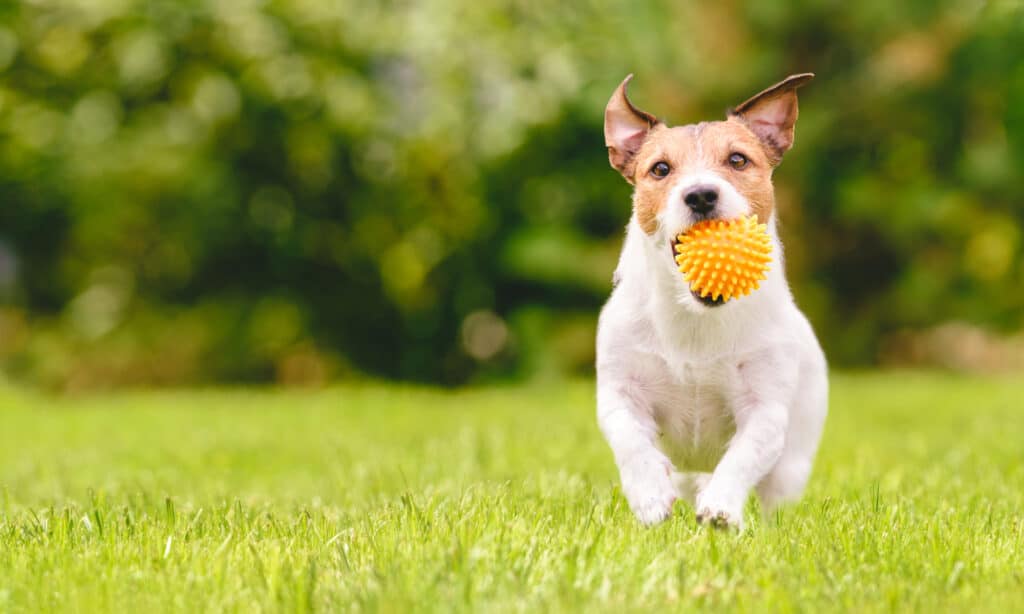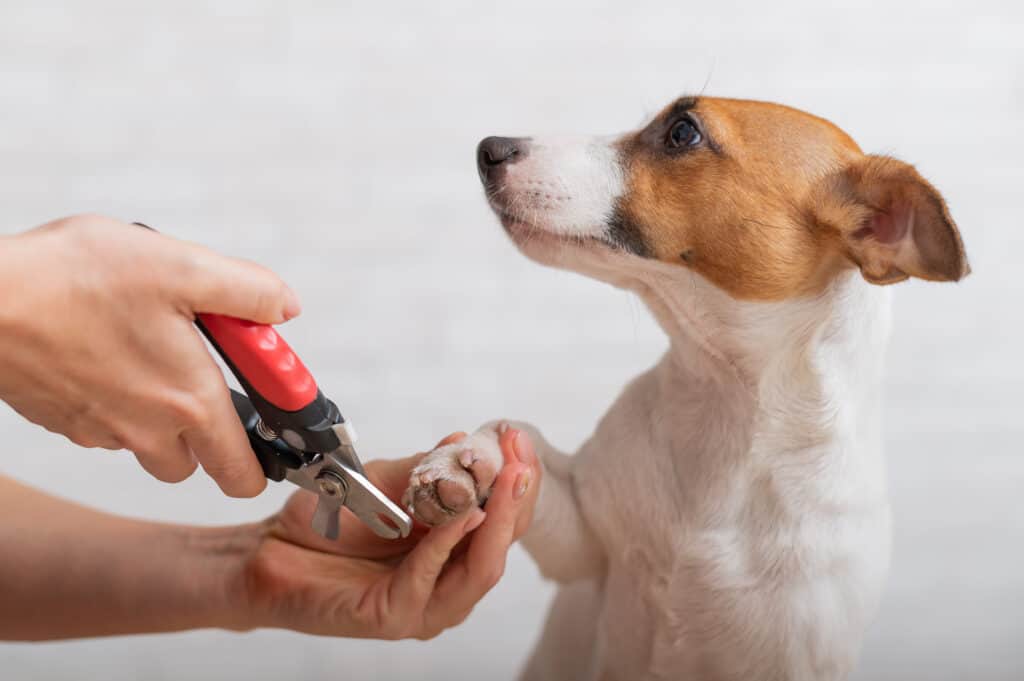If you’re considering getting a Jack Russell, you’ve probably heard that they are a “hyper breed” that wants to constantly be on the go. If so, you may have some doubts about Jack Russells being good house dogs. Can you actually keep them inside and ensure both their and your family’s happiness and health?
While there is some truth to the notion that JRTs need a lot of activity, it’s not entirely accurate to say that they want — or need — to be outdoors 24/7. In fact, as we’ll see below, these pups can thrive when kept inside, under the condition that they are properly cared for.
Can Jack Russells Be House Dogs?

These high-energy pooches love exploring the great outdoors, but they can adjust to almost any environment.
©Liudmila Bohush/Shutterstock.com
Yes, Jack Russells can be house dogs. In fact, despite their high energy levels, they can also adapt well to living in smaller spaces, including apartments or flats. They also function well as part of a larger group, such as a family, as they frequently accompanied their owners on farms and fields throughout history. However, JRTs should be given at least an hour of exercise a day to prevent potential destructive behavior and mental health issues.
So, the short answer is: Jack Russells are good house dogs, but they need owners who can keep up with them. Though generally low-maintenance in terms of beauty routines, these dogs do require a lot of attention and carefully planned activities. For example, if you aren’t able to provide at least an hour-long walk every day, you should plan to make up for it with adequate playtime.
How To Care for Jack Russells Kept Indoors
Jack Russells can be great house dogs, but they weren’t meant to be ones. They were primarily bred to keep foxes away from cattle and crops, spending the majority of their time outdoors. So, to keep them happy and healthy indoors, make sure to apply the following best-practice tips.
Physical Exercise

Don’t overcomplicate it. Simple toys, like rubber balls, can do wonders for this breed.
©alexei_tm/Shutterstock.com
As mentioned, you’ll want to provide your JRT with at least 60 minutes of physical exercise per day. This can include just one activity, such as a long walk, or a combination of different activities. For example, running up and down the stairs, going for a walk, and playing fetch can all do wonders for your pup. In fact, this high-energy breed will likely prefer alternating between different activities!
Also, because they were originally bred for fox-hunting purposes, digging is at the top of their list of favorite activities. So, try to find a place where your JRT can happily dig away; preferably without destroying anyone’s crops or lawn. You can make this activity more fun by hiding their toys or treats beneath the ground.
When lacking physical activity, Jack Russells can become very vocal, i.e., start barking and yapping excessively, and demanding. So, make sure to provide it, at least as much as you can. However, physical exercise alone won’t do it for these intelligent dogs — they need mental stimulation, too.
Mental Stimulation

Exposing your pup to new environments and trying out new activities will keep them mentally stimulated and happy.
©Ksenia Raykova/Shutterstock.com
JRTs are quick learners and can get bored fast, especially if they’re playing a game or doing a trick they’ve already mastered. This can make training a bit difficult, but very necessary. Besides helping develop obedience, training also mentally challenges your pup. And JRTs do indeed love a challenge!
Teaching your dog new tricks, for example, can be especially beneficial. You can gradually make your way from simpler commands, such as “sit” or “stay,” to more advanced ones, like “roll over” or “catch.” Other ways of keeping your JRT mentally stimulated include buying special, interactive dog toys, such as dog puzzles, playing more complex games, like hide and seek, and taking them to new places during walks.
Grooming

Grooming-wise, JRTs are low-maintenance. However, you’ll still want to introduce some beauty routines for your own sake.
©Reshetnikov_art/Shutterstock.com
In all honesty, regular grooming is more important for you than it is for your Jack Russell. However, if you are already keeping them inside, you will know why this step should not be skipped. To clarify for those who don’t, Jack Russells shed a lot — despite having a short coat. You may be finding white hair all over your house, including places your pooch does not even normally occupy. (Author’s note: I know I am!)
To limit shedding or, at the very least, to minimize the hair lying around your house, you should brush them a few times a week. This will also help maintain their coat’s health. It’s advisable, however, to always choose a brush that fits your JRT’s coat texture.
Also, you’ll probably want to trim their nails once a month, check their ears every few weeks and clean them when needed, and brush their teeth every other week (or more often). Bathing-wise, JRTs don’t need much. So, you generally need to bathe them only when you notice a funky odor or when your pup is really dirty.
Co-Living

With proper socialization and training, nothing is impossible. However, JRTs are not naturally fond of sharing their owners or their space with others.
©dezy/Shutterstock.com
Last but definitely not least, you should keep in mind that JRTs don’t thrive in multi-pet households. They’re also a great family pet, but not so great with younger children. This is due to several reasons.
The most obvious one is that Jack Russells love attention. They thrive in the spotlight, and want their owners — and, frankly, everyone else — to be focused solely on them. They can perceive other animals and younger children as trying to “steal their thunder,” which can further lead to aggressive behavior.
Besides that, JRTs tend to get very attached to their owners. At times, they can also become overprotective, jealous, and possessive. They’d prefer it if their owners were always 100% dedicated to them, and no one and nothing else.
With that in mind, you may want to reconsider getting a JRT if you already own another dog or other animals, or have young children. From the get-go, you should be aware that keeping peace in the house may require a lot of work and patience. Consider whether you’re actually ready to invest that much effort into properly training your pup. If so, note that starting early is key, with both training and socialization.
Should You Get a Jack Russell as a House Dog?

Let’s reiterate the key message. JRTs can be great house dogs, but
onlywith the right owners.
©evrymmnt/Shutterstock.com
Whether you should get a Jack Russell as a house dog or not depends on whether you’re able to properly care for them and how they’ll fit into your life. Making a smart decision requires getting familiar with this dog’s needs and personality, and considering your lifestyle and living conditions. To make this easier for you, we’ll quickly go through some biggest pros and cons of getting a JRT as an indoor pet.
Pros
The biggest pro is that Jack Russells are excellent guard dogs. This is very much thanks to their origin and fox-hunting past. They learned they needed to be vocal to draw the attention of others when stumbling upon something unexpected or unwanted on their property (such as a fox). They also learned they needed to be very alert in order to keep their family and themselves safe. Finally, they’re also very confident, and unlikely to flee when faced with a potential threat.
On top of that, Jack Russells are very affectionate, loving, and loyal. They give their families lots of love and dedication and actually love cuddling and relaxing with their owners. Of course, they may need to get their need for physical activity out of the way first.
Finally, JRTs are usually incredibly fun and entertaining dogs. Many owners say there’s never a boring moment with a JRT, and that they always find new ways to surprise them. Combine that with the fact that they’re highly intelligent and quick learners, and you’re in for a blast!
Cons
The biggest con of keeping a JRT as a house dog is how much work it may take. These pups require a lot of attention, patience, and, honestly, stamina. You need to be able to keep up with them, plus dedicate a good chunk of time to catering to their needs. Remember we said they need at least an hour of physical exercise a day? This, together with the fact that you need to routinely introduce new activities and environments, can make being a JRT parent a challenge.
Additionally, JRTs will expect you to play and cuddle with them often. They’ll also likely want to be a part of all of your activities, especially those involving other people. If you think this may be a bit too much for you, consider getting a less active dog, such as a Maltese or a pug.
The photo featured at the top of this post is © evrymmnt/Shutterstock.com
Ready to discover the top 10 cutest dog breeds in the entire world?
How about the fastest dogs, the largest dogs and those that are -- quite frankly -- just the kindest dogs on the planet? Each day, AZ Animals sends out lists just like this to our thousands of email subscribers. And the best part? It's FREE. Join today by entering your email below.
Thank you for reading! Have some feedback for us? Contact the AZ Animals editorial team.







